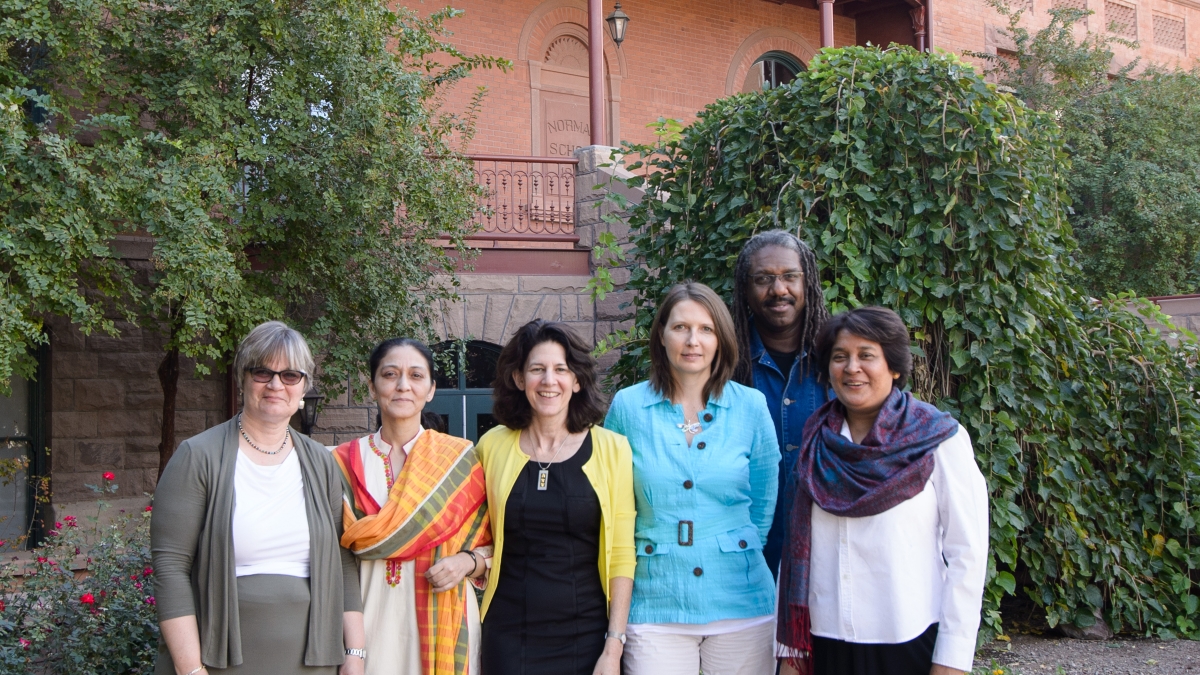ASU receives grant to partner with Pakistan women's college

When most Americans think of Pakistan, images of violence and terrorism likely come to mind. But Pakistan also has an active civil society, mostly led by its women, who are seen as key to combating extremism in the Islamic South Asian republic.
Now Arizona State University will be empowering some of those women through an academic exchange program with a 100-year-old women’s college in Pakistan. The three-year project is being funded by a nearly $1 million grant from the U.S. Department of State through its Pakistan embassy.
The exchange program will involve faculty and students in English and American literature at ASU and Kinnaird College in Lahore, Pakistan. The project’s aims are to globalize research and teaching of American literature and to empower Pakistani women to become leaders and agents of change in academia as well as the larger society.
“This partnership is part of our broader effort to foster global engagement,” says Linell Cady, director of ASU’s Center for the Study of Religion and Conflict, which will oversee the project. “It is a wonderful opportunity to build the cross-cultural knowledge, understanding and relationships so important to life in the 21st century.”
At ASU, the exchange represents a unique collaboration between the ASU Department of English and the Center for the Study of Religion and Conflict, both units in the College of Liberal Arts and Sciences.
The project kicked off this October with a site visit to ASU by Nadia Anjum, head of the post-graduate program in English at Kinnaird. After many conversations over email and through Skype, Anjum finally had the chance to meet the ASU team in person. She returned to Pakistan with her head “loaded with project ideas,” she said.
The ASU team will, in turn, visit Pakistan in spring 2014 to carry out a series of workshops and initiate a comprehensive needs assessment. Working together with Kinnaird faculty and administrators, the team will jointly create an action plan to address the needs of the college and individual teachers and researchers in its American literature program.
The centerpiece of the project is a scholars-in-residence program, which will bring Kinnaird College faculty and graduate students to ASU for up to a full semester. While at ASU, the Kinnaird scholars will build collaborative relationships with ASU scholars, develop research ideas into publishable papers and shape new courses in American literature.
“The scholars-in-residence program will provide ASU faculty and students with a valuable opportunity for cross-cultural discussions,” says Deborah Clarke, professor of English, associate dean of faculty, and the project’s director. “Having Kinnaird scholars here will enable ASU students to consider American literature and culture from an international perspective and to see things they’ve read before with new eyes.”
ASU faculty and graduate students will also travel to Pakistan to spend several weeks at Kinnaird, teaching specialized courses. While there, they will also participate in workshops and roundtable discussions with Pakistani colleagues at Kinnaird that will also include faculty from other academic institutions in Lahore. The discussions will be focused on such common themes as border and migration studies, global feminism and women in academia, pedagogy in a digital age and scholarly publishing.
A final component of the project will be to provide new library resources for the Kinnaird College American literature program and a project website. The latter will enable exchanges between U.S. and Pakistan participants to continue beyond the three-year term of the grant.
“We believe this project will encourage the kind of personal and social transformation that can lead to broader understanding among people, nations and cultures,” says Clarke. “To explore common issues is to engage a world of possibilities as to what it means to be human in a globalized world.”
In 2010, the Center for the Study of Religion and Conflict began an outreach initiative to Pakistan that included collaborations with several universities in Islamabad and Lahore on a series of workshops and conferences on religion, ethics and the humanities.
History professor and Hardt-Nickachos Chair in Peace Studies Yasmin Saikia, one of the faculty members who helped lead that initiative, serves on the executive committee of the American Institute for Pakistan Studies. She has conducted history dissertation workshops and reviewed and evaluated university history curriculum for the Pakistan Higher Education Commission.
Saikia will be involved in the exchange program with Kinnaird College as well. She will help lead the faculty exchanges and serve as liaison to the local Pakistani community during the scholars-in-residence program.
“Women in Pakistan have impressed me immensely because they are resilient, have incredible endurance and have managed to stay hopeful, even in the most difficult times,” says Saikia. “By empowering academic women in Pakistan through this project, we can support their efforts in creating a positive vision of peace.”
Kinnaird College for Women is one of Pakistan’s premier institutions of higher education, offering 40 undergraduate and graduate degree programs in liberal arts, business and media studies to women from all elements of Pakistan society. The college was founded in 1913. It is named for a titled family from Scotland that was involved in social and missionary work through the Presbyterian Church, and who donated funds to help construct the college.
Rounding out the project team are ASU English professors Neal Lester and Claudia Sadowski-Smith.
Lester, who is also director of Project Humanities, has previously been involved with a project to help develop American studies at Sichuan University in China. He will work closely with Saikia and Clarke on developing the modules for the overseas components of the project. Sadowski-Smith will direct the scholars-in-residence component of the project.
For more information about the project, contact Carolyn Forbes, assistant director of the Center for the Study of Religion and Conflict, at csrc@asu.edu.
Story by Barby Grant